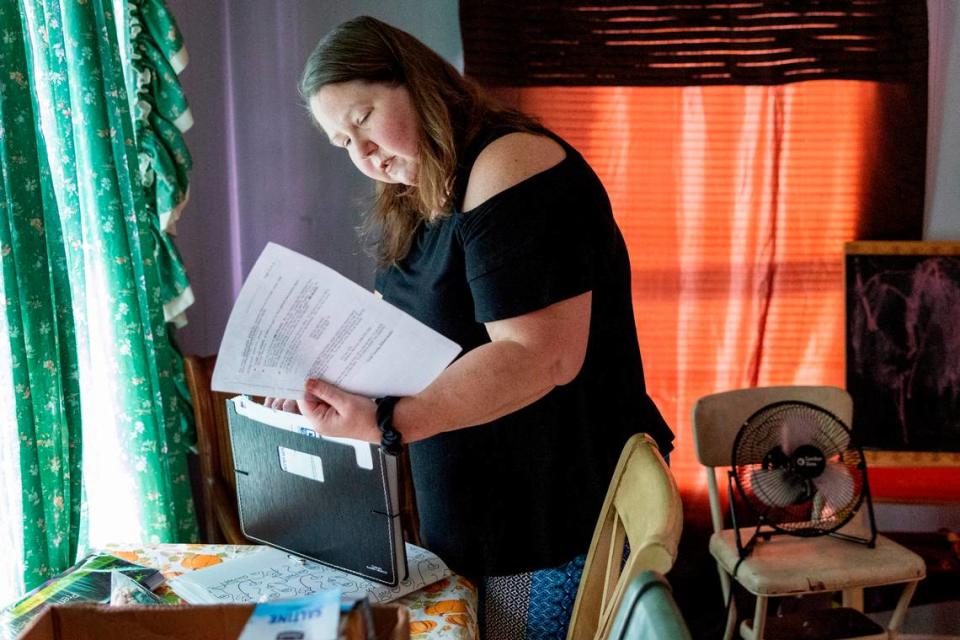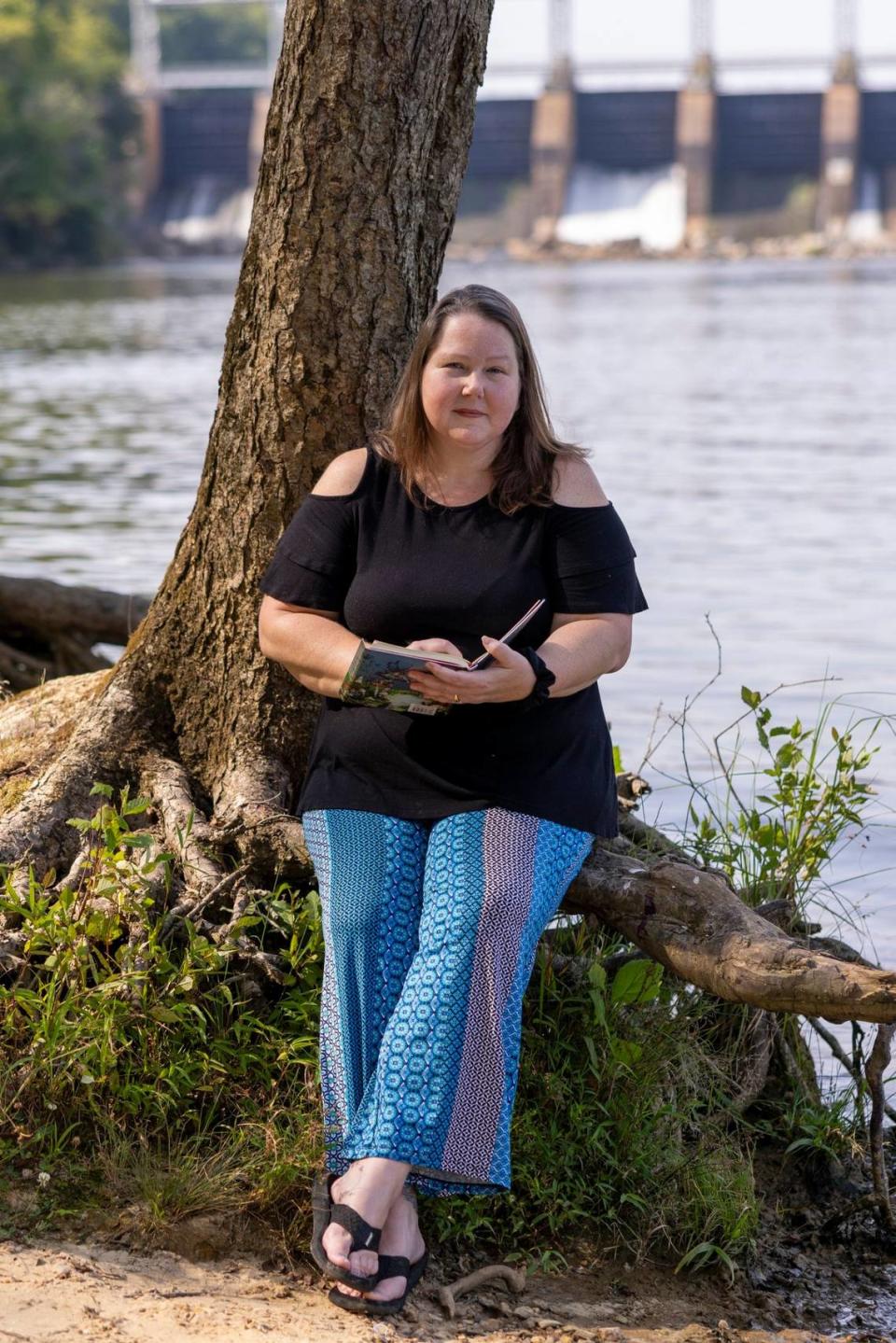Can her life be extended or not? One NC cancer patient’s wait for Medicaid expansion
DeAnna Brandon’s hands shook lightly as she filled out the hospital’s questionnaire on her cancer symptoms.
Nausea, memory loss, fatigue; she checked the boxes on the form.
It was Aug. 8, and Brandon, 45, was at the Novant Health Cancer Institute in Charlotte for one of many appointments.
She was meeting with Dr. Raymond Thertulien, a hematologist and oncologist who specializes in treating multiple myeloma, the rare blood cancer with which Brandon was diagnosed in 2022.
It has no cure.
While Brandon strives to keep a positive outlook, she said before her appointment that she was not expecting any breakthroughs.
Over the past several months, Thertulien, who is managing Brandon’s cancer treatment plan, has recommended she get her own stem cells drawn as soon as possible to use for a transplant, she said.
According to Thertulien, a transplant, in which healthy cells replace damaged cells, would help extend her life expectancy, perhaps by up to 20 years. Otherwise, she could have as little as three years left.
But Brandon has no health insurance. And she said charity care, through which hospitals provide free or discounted services to eligible low-income patients, won’t cover the cost of up to $200,000 to harvest and transplant her own stem cells.
She has been unable to qualify for Medicaid, a state-federal health insurance program for low-income individuals that would cover her transplant. Despite hiring a lawyer, she hasn’t been approved for disability benefits, which would qualify her for Medicaid.
North Carolina, in June, passed Medicaid expansion into law, which would allow Brandon to get coverage. But the implementation of the expansion has been delayed. It was tied to the passage of a budget, which has been on hold following protracted negotiations by the Republican-controlled legislature.
“I feel like I’m holding my breath to get a decision as to whether my life can be extended or not,” Brandon said.
NC has opted out of Medicaid expansion
Medicaid expansion has been a long time coming in North Carolina.
Medicaid provides health insurance coverage to millions across the country and was first signed into law in 1965 by Democratic President Lyndon B. Johnson.
Today, the program represents $1 out of every $6 spent on health care in the United States and is administered by states with broad federal rules and is jointly funded by state and federal governments, with the federal government paying the largest share of costs.
It initially covered only certain categories of individuals, but over time, the federal government expanded eligibility, including in 2010 under Democratic President Barack Obama with the passage of the Affordable Care Act.
This act mandated states expand Medicaid to all adults up to 138% of the federal poverty line, with 90% of costs paid by the federal government for the expansion population. A controversial provision, which was eventually rescinded, imposed penalties on some individuals who did not have health insurance.
The day the act passed, a lawsuit objecting to it was filed by several Republican attorneys general. That led to a U.S. Supreme Court ruling permitting states to opt out of Medicaid expansion.
This means the income limit for eligibility under Medicaid for a parent or caretaker in North Carolina is 41% of the federal poverty level, or just over $8,000 yearly for a family of three. Adults without children, save for those with disabilities or other qualifying exceptions, have no coverage.
People who don’t qualify for Medicaid and those whose jobs don’t provide coverage can get it through the federal Health Insurance Marketplace, which covers those who make between 100% and 400% of the federal poverty level. In 2023, 100% of the federal poverty level for one person is 14,580 and 400% is $58,320.
This leaves a “gap” in coverage for many, who make too much to qualify for Medicaid but too little for subsidies.
Receiving a cancer diagnosis
Born in 1977 in Salisbury, Brandon left home at 16 and had two children by age 19, whom she raised as a single mother. Her father died in 2003, and she had to care for an ailing mother and stepfather. She dealt with anxiety and depression. “The first 20 years of my life, I was running a race,” Brandon said.
Despite these challenges, Brandon got her associate’s degree in business marketing in 2009 and worked various jobs, including at a telemarketing company. She also started therapy as a young adult and was “just trying to do better, doing the next best thing in front of me.”
But things would not slow down. In 2016, her two kids moved out of the house. They were both by then 18, meaning Brandon lost her Medicaid coverage as she was no longer eligible as the parent of a minor. She has not had any insurance coverage since then.
In 2017, her mother and her stepfather passed away within weeks of each other: Her mother due to illness and her stepfather in a car crash.
Brandon was tired. At first, she thought it was grief. But she started getting worried, and in looking for medical care options, she heard about the Community Care Clinic of Rowan County, which provides those who are uninsured or underinsured with free or low-cost health care.
There, Brandon had a blood test, got referrals to cancer specialists, and by July 2022, received her multiple myeloma diagnosis.
“If it was not for them, I still wouldn’t know I had cancer,” Brandon said.
A timeline of Medicaid expansion in NC
With the passage of Medicaid into law in North Carolina, all adults who make below about $20,120 a year can get access to health insurance. The state’s health and human services department estimates this will provide coverage to 600,000 North Carolinians.
Its passage followed years of reticence by North Carolina Republicans, who opted out of expansion and stymied Democratic Gov. Roy Cooper’s efforts to expand Medicaid. By 2022, though, Republicans’ appetite had shifted. Senate leader Phil Berger and House Speaker Tim Moore, who both hold veto-proof supermajorities in their respective legislative chambers, announced in March that they had reached a Medicaid deal. By June, the expansion bill had passed both legislative chambers and was signed into law by Cooper.
Moore said at the time that the bill would “expand access to working North Carolinians.”
“That is going to ensure that there is a more robust supply of a lot of these services. That is going to result in less cost, but at the same time vitally important to protect access to health care, particularly in our rural areas.”
This deal not only includes expansion but also cuts regulations on hospital competition, creates a new mechanism for hospitals to get higher reimbursements under Medicaid and more.
But lawmakers tied expansion to the passage of a state budget, which lawmakers failed to do by the July 1 start of the new fiscal year. And because the budget did not pass by Sept. 1, implementation of Medicaid expansion in North Carolina could wait until December, according to DHHS.
Moore and Berger did not reply to requests for comments from The News & Observer for this story. But legislative leaders have said to expect votes on a budget as early as Sept. 13 and 14. DHHS told The N&O that it would “continue to monitor legislative inaction and make any necessary changes to this timeline.”
Managing cancer care without Medicaid
For Brandon, the Medicaid expansion standstill means she has to manage a web of systems to obtain care. One piece is charity care, for which she said she has to reapply every three months. It helps cover her weekly chemotherapy and other treatments at Novant Health in Rowan County and Novant Health Presbyterian Medical Center in Charlotte. In terms of medications, she gets some of them through a pharmacy in Salisbury and others through NC MedAssist, which provides some prescriptions for free for those who are eligible.
Despite charity care and other aid, Brandon has a three-inch stack of medical bills that have been mailed to her, including from debt collectors, which range from hundreds to thousands of dollars.
“The charity care isn’t 100%. It’s helped a lot, but I still have no money to pay for the bill. Like the hip surgery was $50,000 without charity care. I’ve received a bill for $8,000. Well, you know, ‘Thanks, but I don’t even have $10 to send you right now,’” she said. Brandon had to have hip replacement surgery in May due to weakened bones from her cancer.
A report by the state treasurer’s office and the National Academy of State Health Policy found that six North Carolina nonprofit hospitals have billed $149.2 million to poor patients who should have qualified for free or discounted charity care under the hospitals’ own policies in fiscal year 2019. Hospitals get tax breaks in exchange for providing charity care.
“Each and every step and each and every medicine, I’ve had to apply for and talk to people to try to get financial aid,” Brandon said. “You’re already feeling bad because you’ve been doing chemo and you have cancer and you don’t have much energy, and now you’re having to do the business side of things.”
“It puts this panic in you that, ‘Oh gosh, what if they deny it? What if they don’t get it approved and I can’t get chemotherapy?’” she said.
Nowhere to go
Brandon keeps all of her medical bills tucked inside a briefcase in a trailer home in Salisbury, which she has been renting since January with the help of her boyfriend and her sister.
When she is not in this trailer, which sits next to her daughter Savannah’s home, she lives with her boyfriend and their two dogs in a home in Rockwell, 20 minutes away.
Brandon started renting the trailer because, after the transplant, she will need to fully isolate for up to a year, as her immune system will be shot. She hopes to use the trailer for isolation, but she’s barely making rent. With the delays with Medicaid and her disability application, she doesn’t know how much longer she’ll be able to keep it.
“My fear and my sister’s fear is that we let it go. And then three weeks later, everything works out and then I won’t have anywhere to go.”
On hold, too, are her plans for the future. Brandon wants to write a book on how to manage grief. She wants to sell her art in local shows, or even possibly in other states.
“Waiting for the stem cell and not knowing, it’s hard to set goals,” Brandon said.
“Let’s say if I found I could go back to school and do that. Well, should I? Am I gonna live long enough for it to matter?”





